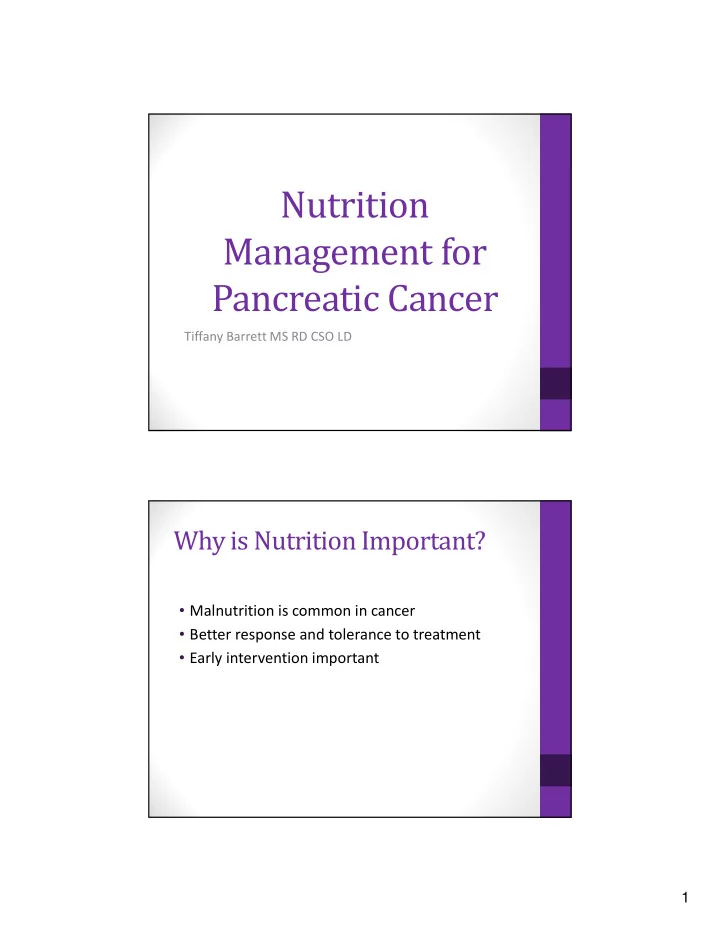

Nutrition Management for Pancreatic Cancer Tiffany Barrett MS RD CSO LD Why is Nutrition Important? • Malnutrition is common in cancer • Better response and tolerance to treatment • Early intervention important 1
Goals of Nutrition Therapy • Manage nutrition related symptoms • Maintain weight and protein status • Adequate Fluids • Control other nutrition related diseases • Maximize quality of life Pancreatic Cancer and Nutrition • Weight loss prior to diagnosis • Post surgical nutrition complications • Side effects of treatment • Malnutrition • Weight loss, wasting, anorexia • Loss of muscle and fat tissue • Inflammatory response by the tumor 2
Pancreas Functions • Produce enzymes to digest food • Produce insulin to move glucose from the blood to the cells to be used for energy Lean Body Mass Loss • Inability to heal and recover from surgery, illness or disease • Decreased strength • Increased risk of falls and fractures • Weakened immune system and increased risk of infections 3
Nutrition Assessment • Appetite/Diet History • Special diet/preferences • Living Arrangements • Supplement use • Symptoms • Mental Status Side Effect Management • Nausea/Vomiting • Taste Alterations • Appetite Changes/Weight Loss • Early Satiety • Diarrhea/Constipation • Malabsorption • Glucose Intolerance 4
Nausea/Vomiting • Avoid greasy, fried, spicy foods • Dry, bland foods • Foods at room temperature • Eliminate strong odors • Small meals • Avoid empty stomach • Anti emetics Taste Alterations • Practice good oral care • Experiment with new foods • Use plastic utensils, cups, bottles • Vary temperatures • Zinc supplement? • Marinades, tart, acidic flavors 5
Appetite, Early Satiety • Nutrient Dense Foods • 6 small meals • Plan meals and snacks • Decrease fat portions • Increase Activity Diarrhea • Causes: • Dumping (post surgery) • Treatment side effects • Pancreatic Insufficiency 6
Diarrhea • Increase soluble Fiber • Decrease Insoluble Fiber • Limit sugar alcohols • Lactose • Probiotics • Fluids between meals • Avoid hot liquids Pancreatic Insufficiency • Cramping with meals • Indigestion • Increased amounts of gas • Foul smelling stools/gas • Floating stools, greasy • Weight Loss • Increased frequency 7
Pancreatic Insufficiency • Take enzymes at beginning of meal/snack and throughout • Manage dosage with the fat content of meal • Dosage based on elimination of symptoms • Antacid as needed • Titration of enzymes Constipation • Warm Fluids • Increase activity • Limit gas producing foods (including straws, gum, carbonated drinks) • Fiber 8
Glucose Control • Limit simple sugars, refined carbohydrates • Combine foods • Protein, fat, fiber • Medication management Protein • Lean meats • Fish, chicken, turkey, beef • Beans, lentils • Eggs • Yogurt, milk and cheese • Nuts, Nut butters • Soy 9
Fat Sources • Limit saturated added fats: • Butter, lard, margarine • Nuts and Seeds • Avocado • Olive and Canola Oil Increase Fluid Intake • Water • Juice • Milk • Broth • Tea • Jell-O • Sport Drinks 10
Nutrition Supplements • Ensure/Boost • Clear/Breeze • Glucerna • Unjury • Orgain/Enu • Protein powder Supplements? • Adequate diet: One a Day • Dietary Supplements • Vitamins and Minerals • Herbs • Omega 3/Fish Oil • Interactions with conventional treatment 11
Long Term Nutrition • Plant Based Diet • Healthy Fats • Reduce intake of red meats • Limit salted, cured, smoked foods • Increase Activity • Continue enzymes 12
Recommend
More recommend